
Kevin Armstrong (born 2 February 1958) is an English rock guitarist, record producer and songwriter, best known for his work with David Bowie, Iggy Pop and Morrissey.

Kevin Armstrong (born 2 February 1958) is an English rock guitarist, record producer and songwriter, best known for his work with David Bowie, Iggy Pop and Morrissey.
Born in Farnborough, Kent, Armstrong attended St. Mary Cray Primary School and St. Olave's Grammar School, Orpington, Kent.
Armstrong was signed by Charlie Gillett's Oval Records in 1980 and formed the group Local Heroes SW9 - as they were living in Stockwell, London - (with Matthew Seligman on bass and Kim Barti on drums) and released two albums, Drip Dry Zone in 1980 and New Opium in 1981. [1] [2] [3] [4]
Armstrong recorded with Thomas Dolby on his first two albums The Golden Age of Wireless and The Flat Earth . [5]
Armstrong took part in the recording of The Passions's third album Sanctuary , produced by Mick Glossop. The first single from that album was "Jump for Joy", which was released on 5 May 1982, followed by the album and the "Sanctuary" single on 18 September 1982.
Armstrong collaborated with David Bowie on the soundtrack for the film Absolute Beginners . [6] He also played in the band for David Bowie's Live Aid appearance in 1985, [7] and recorded the song "Dancing In The Street" with David Bowie and Mick Jagger. [8]
He played guitar on the Iggy Pop 1986 album Blah Blah Blah and was musical director for Iggy Pop's world tour in 1986/87. [9]
Armstrong joined Steve Nieve's band for the Jonathan Ross Channel 4 chat show The Last Resort for two seasons in 1989, accompanying Paul McCartney. [10]
In 1989, David Bowie asked Armstrong to join Tin Machine [11] as the fifth member after he played on the debut album recorded in Switzerland and the Bahamas.
In 1992, he co-wrote the title track of David Bowie's Outside album, with Bowie. [12]
Armstrong was a co-songwriter ("Piccadilly Palare", [13] "He Knows I'd Love To See Him" [14] and "Oh Phoney") [15] and guitarist for Morrissey for some of the recordings that appeared on the album Bona Drag produced by Clive Langer. [16] In 1992 he produced the debut album by Nigerian artist Keziah Jones for Delabel France entitled Blufunk Is a Fact . [17] Later he produced other albums for Jones, Black Orpheus (2004), [18] Nigerian Wood (2008) and Captain Rugged (2013). [19]

In 2007, he was guitarist on a world tour with Sinéad O'Connor [20] and, in 2010, he played on new material with Thomas Dolby and toured the world in 2012 as Dolby's guitarist. [21] In 2015/6, he put together and led the band for Iggy Pop's live appearances worldwide. In 2019, Armstrong released the album Run on Wishing Tree Records. A 2020 American tour with a band of all David Bowie alumni headed by Mike Garson called A Bowie Celebration was interrupted because of the coronavirus crisis.
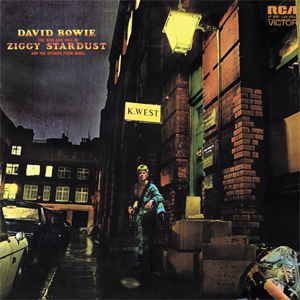
The Rise and Fall of Ziggy Stardust and the Spiders from Mars is the fifth studio album by the English musician David Bowie, released on 16 June 1972 in the United Kingdom through RCA Records. It was co-produced by Bowie and Ken Scott and features Bowie's backing band the Spiders from Mars — Mick Ronson (guitar), Trevor Bolder (bass) and Mick Woodmansey (drums). It was recorded from November 1971 to February 1972 at Trident Studios in London.
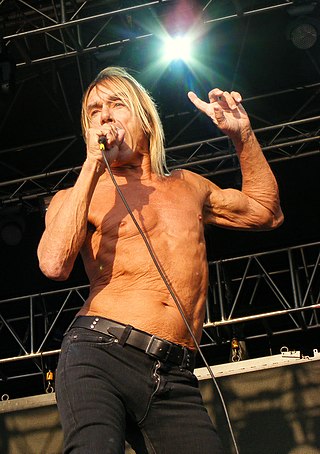
James Newell Osterberg Jr., known professionally as Iggy Pop, is an American singer, musician, songwriter, actor and radio broadcaster. He was the vocalist and lyricist of proto-punk band the Stooges, who were formed in 1967 and have disbanded and reunited many times since. Often called the "Godfather of Punk", he was named one of the 50 Great Voices by NPR. In 2010, he was inducted into the Rock and Roll Hall of Fame as a member of the Stooges. Pop also received a Grammy Lifetime Achievement Award in 2020 for his solo work.

Raw Power is the third studio album by American rock band the Stooges, released on February 7, 1973 by Columbia Records. The album departed from the "groove-ridden, feel-based songs" of the band's first two records in favor of a more anthemic hard rock approach inspired by new guitarist James Williamson, who co-wrote the album's eight songs with singer Iggy Pop. Pop produced the recording sessions himself and David Bowie assisted with post-production work, though the team were allotted only one day to mix the album and the resulting fidelity was poor. Later reissues have attempted to either correct or enhance the original mix, most notably Pop's 1997 remix, which became notorious for its extreme volume and compression.
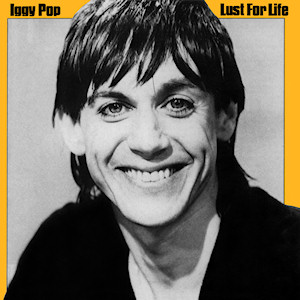
Lust for Life is the second solo studio album by the American musician Iggy Pop, released on September 9, 1977, through RCA Records. It was his second collaboration with David Bowie after The Idiot, released in March the same year. Shortly after Bowie released his own album Low in January, Pop went on a tour to support The Idiot with Bowie as his keyboardist. At the tour's conclusion, Pop and Bowie regrouped in Berlin to record the former's next solo album.
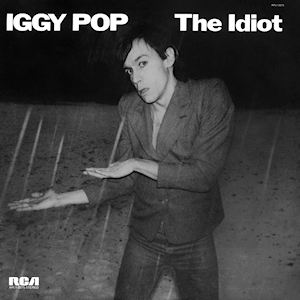
The Idiot is the debut studio album by the American musician Iggy Pop, released on March 18, 1977, through RCA Records. It was produced by David Bowie and primarily recorded at the Château d'Hérouville in Hérouville, France. The album followed the break-up of Pop's band the Stooges in 1974 and a period of drug addiction for both Pop and Bowie, after which the two moved to Europe in an effort to kick their addictions.
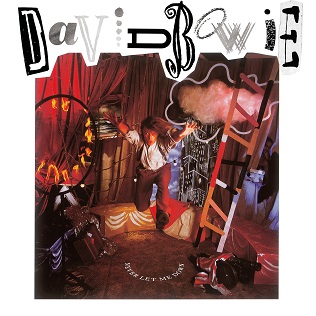
Never Let Me Down is the seventeenth studio album by the English musician David Bowie, released on 21 April 1987 through EMI America Records. Co-produced by Bowie and David Richards and featuring guitarist Peter Frampton, the album was recorded in Switzerland and New York City from September to November 1986. Bowie's goal for the project was to record it differently following his disappointment with 1984's Tonight. Musically, Never Let Me Down has been characterised as pop rock, art rock and hard rock; Bowie himself considered the record a return to rock and roll music. The cover artwork features Bowie surrounded by numerous elements from the songs.
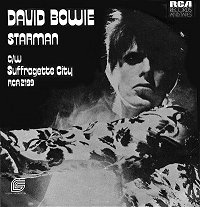
"Starman" is a song by the English musician David Bowie. It was released on 28 April 1972 by RCA Records as the lead single of his fifth studio album The Rise and Fall of Ziggy Stardust and the Spiders from Mars. Co-produced by Ken Scott, Bowie recorded the song on 4 February 1972 at Trident Studios in London with his backing band known as the Spiders from Mars – comprising guitarist Mick Ronson, bassist Trevor Bolder and drummer Mick Woodmansey. The song was a late addition to the album, written as a direct response to RCA's request for a single; it replaced the Chuck Berry cover "Round and Round" on the album. The lyrics describe Ziggy Stardust bringing a message of hope to Earth's youth through the radio, salvation by an alien "Starman". The chorus is inspired by "Over the Rainbow", sung by Judy Garland, while other influences include T. Rex and the Supremes.

Tin Machine is the debut studio album by the Anglo-American hard rock band Tin Machine, released on 22 May 1989 through EMI America Records. The band consisted of the English singer-songwriter David Bowie, the American guitarist Reeves Gabrels and brothers Tony Fox and Hunt Sales on bass and drums, respectively, while Englishman Kevin Armstrong acted as an additional guitarist. The project was spearheaded by Bowie, who felt disconnected in his career by 1987 and looked to reinvent himself. After meeting Gabrels through his Glass Spider Tour, the two agreed to work together and would collaborate frequently for the next decade. Bowie hired the Sales brothers, neither of whom he had worked with since the 1970s, after a meeting in Los Angeles, while English producer Tim Palmer was hired to co-produce.

Tin Machine II is the second and final studio album by the Anglo-American rock group Tin Machine, released on 2 September 1991 through Victory Music. The band, composed of David Bowie, Reeves Gabrels on guitar and brothers Tony Fox and Hunt Sales on bass and drums, respectively, recorded it in Sydney, Australia in late 1989 at the conclusion of the Tin Machine Tour. After Bowie completed his solo Sound+Vision Tour in late 1990, recording resumed in Los Angeles, California until March 1991. The production was handled by Tin Machine and Tim Palmer, who produced their debut studio album (1989), with additional production by Hugh Padgham on "One Shot". While the album musically retains a hard rock sound, the songs are more melodic compared to its predecessor, with lyrics focusing on love.
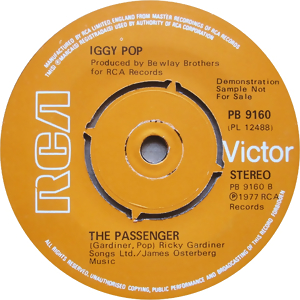
"The Passenger" is a song written by Iggy Pop and Ricky Gardiner, recorded and released by Iggy Pop on the Lust for Life album in 1977. It was also released as the B-side of the album's first single, "Success". It was released as a single in its own right in March 1998, reaching number 22 in the UK charts.
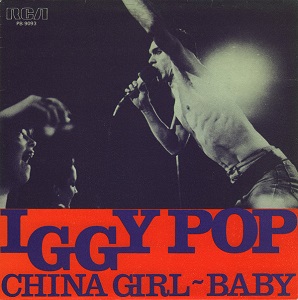
"China Girl" is a song written by Iggy Pop and David Bowie in 1976, and first released by Pop on his debut solo album, The Idiot (1977). Inspired by an affair Pop had with a Vietnamese woman, the lyrics tell a story of unrequited love for the protagonist's Asian girlfriend, realizing by the end that his Western influences are corrupting her. Like the rest of The Idiot, Bowie wrote the music and Pop improvised the lyrics while standing at the microphone. The song was released as a single in May 1977 and failed to chart.

"Absolute Beginners" is a song written and performed by the English singer-songwriter David Bowie. Recorded in August of 1985, and released on 3 March 1986, it was the theme song to the 1986 film of the same name. Although the film was not a commercial success, the song was a big hit, reaching No. 2 on the UK singles chart. It also reached the top 10 on the main singles charts in ten other countries. In the US, it peaked at No. 53 on the Billboard Hot 100.
"Panic in Detroit" is a song written by the English singer-songwriter David Bowie for the album Aladdin Sane in 1973. Bowie based it on his friend Iggy Pop's descriptions of revolutionaries he had known in Michigan and Pop's experiences during the 1967 Detroit riots. Rolling Stone magazine called the track "a paranoid descendant of the Motor City's earlier masterpiece, Martha and the Vandellas' "Nowhere to Run"".
"Cracked Actor" is a song by the English musician David Bowie, released on his sixth studio album Aladdin Sane (1973). The track was also issued as a single in Eastern Europe by RCA Records in June that year. The song was written during Bowie's stay in Los Angeles during the American leg of the Ziggy Stardust Tour in October 1972. Co-produced by Bowie and Ken Scott, it was recorded in January 1973 at Trident Studios in London with his backing band the Spiders from Mars – comprising Mick Ronson, Trevor Bolder and Woody Woodmansey. A hard rock song primarily led by guitar, the song describes an aging Hollywood star's encounter with a prostitute, featuring many allusions to sex and drugs.
The Passions were a British-Irish post-punk/new wave band which formed in 1978 and disbanded in 1983. The Passions' music was grounded mainly in Barbara Gogan's voice and Clive Timperley's delicate Echoplex guitar work. They were considered a one-hit wonder due to their early 1981 single "I'm in Love with a German Film Star".

Blah-Blah-Blah is the seventh studio album by American musician Iggy Pop. Released in September 1986, on the label A&M, it is his most commercially successful album. Blah-Blah-Blah appeared after a four-year hiatus for Pop, with David Bowie serving as his prime collaborator. It would be their final collaboration. A successful tour followed the album's release.

TV Eye Live 1977 is a live album by the American musician Iggy Pop originally released in 1978. Iggy took a $90,000 advance from RCA Records to finish his contract with a live album. According to AllMusic, the album was assembled from soundboard tapes. Iggy Pop doctored them in a German studio, quickly and cheaply for around $5,000. The album features recordings from concerts on March 21 & 22, 1977 at The Agora in Cleveland, Ohio; on March 28, 1977 at The Aragon in Chicago, Illinois; and on October 26, 1977 at The Uptown Theater in Kansas City, Missouri.
Erdal Kızılçay is a multi-instrumentalist musician of Turkish birth. He has worked with, among others, David Bowie. He plays bass guitar, oud, drums, keyboards, trumpet and violin. He lives in Aegerten, Switzerland.
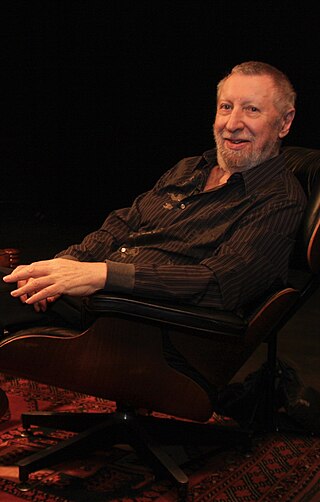
Anthony Defries is a British former music manager and impresario. He managed David Bowie's career during his elevation to global stardom, but later fell out with him in a contract dispute. He established a rights management organisation called MainMan and helped launch the careers of Iggy Pop, Mick Ronson, Mott the Hoople, Dana Gillespie, Lou Reed, Luther Vandross and John Cougar Mellencamp. Defries and MainMan have received multiple awards for their achievements in the music industry.
Paul Trynka is a British rock journalist and author. He was the editor of the music magazine Mojo from 1999 to 2003, and has also worked as editorial director of Q and editor of International Musician. In 2004, he edited publisher Dorling Kindersley's compilation of the Mojo Special Limited Edition issues on the Beatles. He has also written for The Independent and Classic Rock magazine, and contributed articles on music, fashion, design or travel for The Guardian, Elle and Blueprint, among other publications. Before turning to journalism, he worked as a professional musician with the band Nyam Nyam, recording albums for the Beggars Banquet and Factory Benelux record labels.